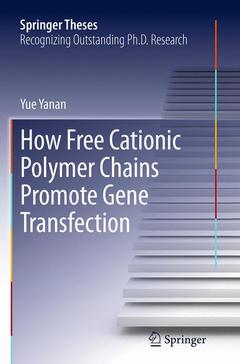Description
How Free Cationic Polymer Chains Promote Gene Transfection, 2013
Springer Theses Series
Language: English
Subject for How Free Cationic Polymer Chains Promote Gene Transfection:
Publication date: 08-2016
Support: Print on demand
Publication date: 06-2013
94 p. · 15.5x23.5 cm · Hardback
Description
/li>Contents
/li>Comment
/li>
Introduction and background.- Revisiting complexation between DNA and polyethylenimine: the effect of uncomplexed chains free in the solution mixture on gene transfection.- Revisiting complexation between DNA and polyethylenimine: the effect of length of free polycationic chains on gene transfection.- Quantitative comparison of endocytosis and intracellular trafficking of DNA/polymer complexes in the absence/presence of free polycationic chains.
These books may interest you

Nucleic Acid Transfection 210.99 €

New Methods of Polymer Synthesis 52.74 €


